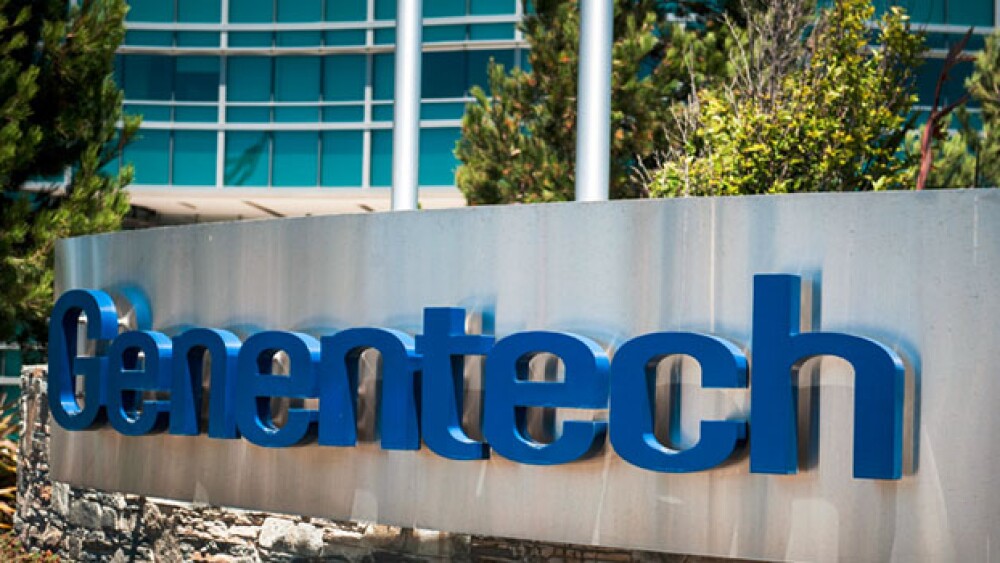Genentech, a Roche company, is flexing its litigation muscle this week. The South San Francisco-based company has filed 18 lawsuits over the past few weeks to block competitors from selling a generic version of a treatment for idiopathic pulmonary fibrosis, a fatal lung-scarring disease.
Genentech, a Roche company, is flexing its litigation muscle this week. The South San Francisco-based company has filed 18 lawsuits over the past few weeks to block competitors from selling a generic version of a treatment for idiopathic pulmonary fibrosis, a fatal lung-scarring disease.
Genentech’s treatment, Esbriet, was brought into the company’s pipeline in 2014 after Roche acquired Brisbane, Calif.-based InterMune, the company that developed the drug in an $8.3 billion deal. Esbriet was approved by the U.S. Food and Drug Administration (FDA) two months after the acquisition was announced.
At the time of the approval, Esbriet was estimated to have a potential patient population of about 100,000 people in the United States. Idiopathic pulmonary fibrosis (IPF) is a fatal disease caused by progressive scarring of the lungs, which makes breathing difficult and prevents the heart, muscles and vital organs from receiving enough oxygen to work properly. The disease can advance quickly or slowly, but eventually, the lungs will harden and stop working altogether. There is no known cure for IPF. The median survival time from diagnosis is two to five years, and the five-year survival rate is approximately 20 to 40 percent, Genentech said in a statement.
Genentech reaped the rewards of InterMune’s 12 years of research that went into the regulatory approval. Esbriet is expected to top $1 billion in sales for 2018, according to the San Francisco Business Times, which first reported the multiple lawsuits. Esbriet, as the Times noted, has patent protection until 2021. But, other companies are lining up to challenge the drug’s blockbuster status. The Times reported that at least 18 generic drugmakers, most of which are based in India, filed Abbreviated New Drug Applications with the FDA to piggyback off of Esbriet’s clinical data and seek quick approval of a generic version. Not all of the companies are from India. There are some well-known generics drugmakers in the mix too, including Sandoz, a Novartis company, and Israel-based Teva Pharmaceuticals.
Genentech is doing what it can to protect revenues generated by Esbriet, which has an annual wholesale price of about $100,000. The only other approved therapy for IPF is Boehringer-Ingelheim’s Ofev.
Esbriet, which was approved under Breakthrough Therapy Designation, inhibits with the production of Transforming Growth Factor-beta, a small protein in the body involved in how cells grow and Tumor Necrosis Factor (TNF)-alpha, a small protein that is involved in inflammation.
At the same time Genentech is looking to protect Esbriet, this morning the company struck an agreement with Xencor, Inc. to develop and commercialize novel IL-15 cytokine therapeutics, including XmAb24306. XmAb24306 is an IL-15/IL-15Rα cytokine complex engineered with Xencor’s bispecific Fc domain and Xtend Fc technology and is Xencor’s most advanced preclinical cytokine program.
James Sabry, global head of pharma partnering at Roche, said the company believes cytokine therapy will play an important role in the treatment of a wide range of diseases, including cancer
“This collaboration with Xencor will further enhance our understanding of a critical immune activation pathway and may present a potential new way to use the immune system to target cancer,” Sabry said in a statement.
Under terms of the agreement, Genentech will pay Xencor $120 million upfront, and Xencor will be eligible to receive up to $160 million in development milestones for the XmAb24306 program, as well as up to $180 million in development milestones for each new IL-15 drug candidate.
Genentech also said today that the FDA is reviewing a supplemental Biologics License Application submitted by Genentech for Kadcyla as adjuvant (after surgery) treatment for people with HER2-positive early breast cancer (EBC) with residual disease after neoadjuvant (before surgery) treatment. The FDA granted Kadcyla Breakthrough Therapy Designation for this indication, which is designed to expedite the development and review of medicines intended to treat serious or life-threatening diseases.





